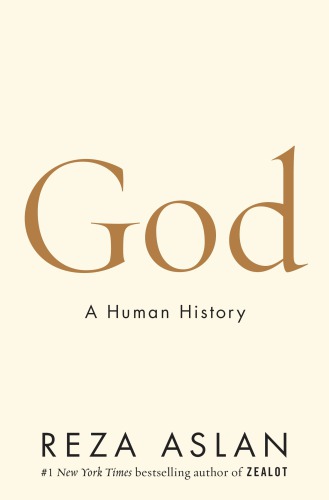
God
A Human History
کتاب های مرتبط
- اطلاعات
- نقد و بررسی
- دیدگاه کاربران
نقد و بررسی

October 1, 2017
Seeing the concept of God as an expression of the self.Aslan (Zealot: The Life and Times of Jesus of Nazareth, 2013, etc.) takes readers on a historic journey to trace the idea of God from prehistoric times to the rise of Islam. His contribution to this well-trodden path is to see God as a mirror of the believer. Not only does he advocate for theories that humans anthropomorphize God because of genetic or evolutionary predispositions to do so, but he goes so far as to embrace this as a form of belief--pantheism--that "God" is indeed present in all creation. Aslan provides an intriguing glimpse into the history of primitive human belief systems, as evidenced by such archaeological remains as cave paintings, burial sites, and primitive temples. He goes further to explore psychological and physiological reasons for the birth of belief. The author notes how the humanized idea of God (or, more properly, gods) was stretched to its limits in Greek and Roman cultures and finally gave way to monotheism after the Babylonian conquest of Israel. In the remainder of the book, Aslan discusses Christianity (another example of humanized divinity) and Islam, in which the struggle to truly understand the concept of God as something more than a divine being reaches its limits. The author seems anxious to shock readers with his argument that God is in everything. "I am," he writes dramatically, "in my essential reality, God made manifest. We all are." Aslan's conclusion is not necessarily revolutionary, though to many believers, it may seem surprising. As a history, the book is a brief yet interesting, mostly engaging work, though it does not touch on the idea of God as manifested in Asian cultures. Though the two books have differing scopes and purposes, Karen Armstrong's 1993 classic, A History of God, is a better choice.Slightly shocking but not groundbreaking--a readable but minor addition to the body of knowledge about "God."
COPYRIGHT(2017) Kirkus Reviews, ALL RIGHTS RESERVED.

October 9, 2017
Aslan (Zealot) addresses ideas about the nature of deities in this wide-ranging work that traces the history of divine beings from the beliefs of humans’ earliest ancestors to contemporary assumptions. The book showcases Aslan’s signature style—verging on academic but always accessible—and his methodological agnosticism as he sets aside claims of truth about “God” in order to explore theories on how humans have come to believe in gods, humanize them, deify humanity, and conceive of gods across the ages. Aslan is adept at translating serious academic theory into lay-reader friendly prose, but he also shares his own perspective as a person of faith and advocates for a renewed pantheism—though he says it can be called by many names. In making his case for pantheism, he barely mentions the voices of Hindu traditions, lesser known pantheistic philosophies, or specific indigenous traditions that have long held beliefs similar to those he advocates. Despite these issues, any general reader interested in religion will find much to learn about how the idea of God or gods has evolved and changed according to geographical, economic, political, and social contexts. Agent: Elyse Cheney, Cheney Agency.

December 1, 2017
As with Jack Miles's God: A Biography, which dealt solely with the development of the image of God in the Hebrew Scriptures, Aslan (creative writing, Univ. of California Riverside; Zealot) surveys the idea of the divine as it developed over the years in various religions, from the primitive to the revealed. He holds that we need to develop a more pantheistic notion of God and stop foisting our human attributes on the divine. Having himself passed through at least a couple of religions, Reza now mostly identifies with Sufism, the mystical sect of Islam, although he would not call it the "right" religion. Aslan seeks not to prove or disprove God's existence (which he holds to be impossible) but rather to encourage a more primal spirituality that recognizes that religion is part of human nature. Having read widely in anthropological, sociological, scientific, and religious works, the author sums up serious scholarship in an engaging manner, with crisp, lucid prose. VERDICT Written in language accessible to the layperson but based on wide reading in the relevant literature, Aslan's work will appeal to anyone interested in the history of religion, especially in theories that go against mainstream interpretations.--Augustine J. Curley, Newark Abbey, NJ
Copyright 2017 Library Journal, LLC Used with permission.

November 15, 2017
Aslan, who has written about Muhammad and Islam in No God but God (2011) and Jesus in Zealot (2013), now takes on his biggest subject. This is a reader-friendly overview of how God came to inhabit the minds and psyches of humanity, noting how, from the first go, people conceived Him (and Her) in their own images. Aslan calls this process of personification hardwired in our brains and is, thus, central to religion. At various points, he offers psychological analysis to bolster his theory. Aslan marches through history, beginning with ancient ancestors and including a stop to look at cave paintings. When organized religion comes into focus, Aslan describes how the concept of one god evolved from many gods. Surprisingly, he gives Judaism's role in that process rather short shrift. In the end, he circles back to the beginning of humans' search for God, concluding that there is a third way to think about God, beyond the belief that either God created us in His image or we created God in ours. A brisk, informative read backed by copious notes almost as long as the text.(Reprinted with permission of Booklist, copyright 2017, American Library Association.)

























دیدگاه کاربران